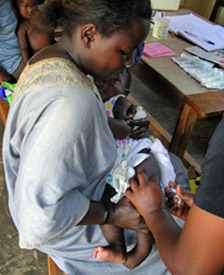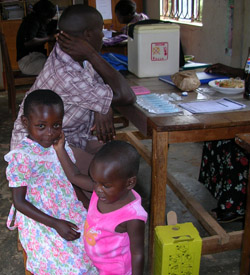Site will be
unavailable for maintenance from June. 4, 11:30 p.m., to June 5, 12:30 a.m. ET. Thank you for your
patience!
Early Childhood Development and Home Gardens in Uganda
Posted on 11/22/2005
By Paul Mayende, CCF-Uganda Staff
It is quite a cloudy day and almost three hours after sunrise. We are walking through the Bbiina community visiting families and receiving updates from the mothers regarding their childcare activities.
 |
| Immunizations are administered as part of CCF-Uganda's early childhood care and develepment initiative. |
The community is 12 kilometers east of Uganda’s Capital, Kampala, and one of the numerous suburban communities. The salient characteristics of this area are, among other things, insufficient access to health services and sanitation facilities, resulting in child malnutrition and high infant mortality.
With the help of Christian Children’s Fund-Uganda, the Bbiina program community has expanded efforts to improve child survival through early childhood care and development.
Rose Jawe, coordinator for CCF Early Childhood Care and Development, is on a routine visit to families whose children are enrolled in the program. This program includes more than 323 children under the age of eight. Activities are aimed at stimulating a child’s mind through games and play. Physical development is also monitored and nutrition support and immunizations administered.
The children come to the early childhood care and development center three times a week. There, they are fed and play with other children. Parents or caregivers, who bring a majority of the children to the center, attend classes, parenting seminars and other related workshops.
Every CCF-Uganda program community now has an early childhood care and development center.
In total, CCF-Uganda operates 94 such centers.
Mangos, bananas and avocados
One of the major components of improving childhood survival is improving nutrition. CCF encourages participating families to plant home gardens to give added calories and nutrients to the children’s diets. Five-year-old Maria, one of the children participating in the program, shows a marked improvement in her nutrition.
 |
| The CCF-Uganda initiative includes a men's awareness program about the importance of children's nutrition. |
“Initially, the Bbiina project was supporting us in feeding Maria on beans, soy porridge, eggs, potatoes and fish,” said Maria’s grandmother, Mary. “Now she is out of danger and we get fruit and vegetable seeds to plant at home.”
As part of CCF-Uganda’s Kitchen Gardening Program, Mary cultivates seeds to provide nutritious foods for Maria and her other grandchildren. At present, more than 83 families take part in this program.
Another child who benefits from his family’s home garden, Faisal lives with his mother and a family friend, Proscovia.
“When there are mangos in the house, we share with the other kids,” Proscovia said. “That way, they share whatever they have with Faisal.”
“When you do this, it is easy for children to have a balanced diet. You give mangos, the neighbor will give Faisal a banana and then the mother of another child will give Faisal an avocado. In one day, instead of Faisal eating just mangos, he will have eaten bananas and avocados.”
The Bbiina program community procures the seeds and distributes them to parents for planting. Mothers are also encouraged to include these fruits and vegetables in their own diets.
The CCF-Uganda initiative includes a men's awareness program about the importance of children's nutrition.
As Hadija, an 18-year-old mother, remarked: “For love’s sake, when you have one egg, you are always tempted to give it to the husband. Now I insist that it is given to the child.”
Loading...


